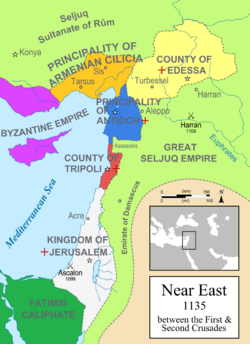Outremer
Topic: Religion
 From HandWiki - Reading time: 3 min
From HandWiki - Reading time: 3 min


Outremer (French: outre-mer, meaning "overseas") was a general name used for the Crusader states; it originated after victories of Europeans in the First Crusade and was applied to the County of Edessa, the Principality of Antioch, the County of Tripoli, and especially the Kingdom of Jerusalem. During the Renaissance, the term was later often equated to the area of the Levant and it remains synonymous for the Holy Land.[1]
The Armenian Kingdom of Cilicia originated before the Crusades, but it was granted the status of a kingdom by Pope Celestine III. It later became fully westernised by the French House of Lusignan.
In general, the French used this term to refer to any land "overseas". For example, King Louis IV of France was called "Louis d'Outremer", as he was raised in England .
In the Chanson de Roland, "Outremer" is used as the name of a fictional Muslim country. It is identified as one of the many countries participating in the general mobilization of the Muslim world against Christianity at the climax of the plot.
Present-day use
The modern term outre-mer, spelled with a hyphen and equally meaning "overseas," is used by the French government for the overseas departments and territories of France (in French: Départements d'outre-mer – Territoires d'outre-mer or DOM–TOM, collectively Pays et territoires d'outre-mer (PTOM)). It is also the name of a French catamaran manufacturer based in La Grande-Motte.
Literature
- In Monsieur, or The Prince of Darkness (1974), Lawrence Durrell's first novel of The Avignon Quintet, the first section is entitled "Outremer" and is set in Provence.
- David Nicolle: Knight of Outremer 1187–1344 AD, Warrior No. 18. Osprey Publishing, Oxford 2003. ISBN 1-85532-555-1.
- Robert E. Howard: Hawks of Outremer, West Kingston, Rhode Island: Donald M. Grant, 1979.
- Sharon Kay Penman : "Lionheart", G.P. Putnam's Sons, New York 2011. Marian Wood Books/Putnam, London 2011. ISBN 978-0-399-15785-1.
In "Lionheart", the protagonists are introduced sailing to Outremer. The novel revolves around Richard the Lionheart's Crusades in the Holy Land.
See also
- Holy Land
- Shaam
- Timeline of the name "Palestine"
References
- ↑ Johnson, Paul (1979) (in English). Civilizations of the Holy Land. Weidenfeld and Nicolson. p. 202. "Of the enormous literature which the crusades inspired in Europe, only one poem of any importance was actually written in the Holy Land, or Outremer as the Latins called it: the so-called Chanson des Chetifs, produced at Antioch a little before 1149."
- Helen Nicholson (2004). Knight Templar (1120-1312). Osprey Publishing ltd.. ISBN 1-84176-670-4.
External links
- "The French of Outremer", Medieval Studies, Fordham University
 KSF
KSF